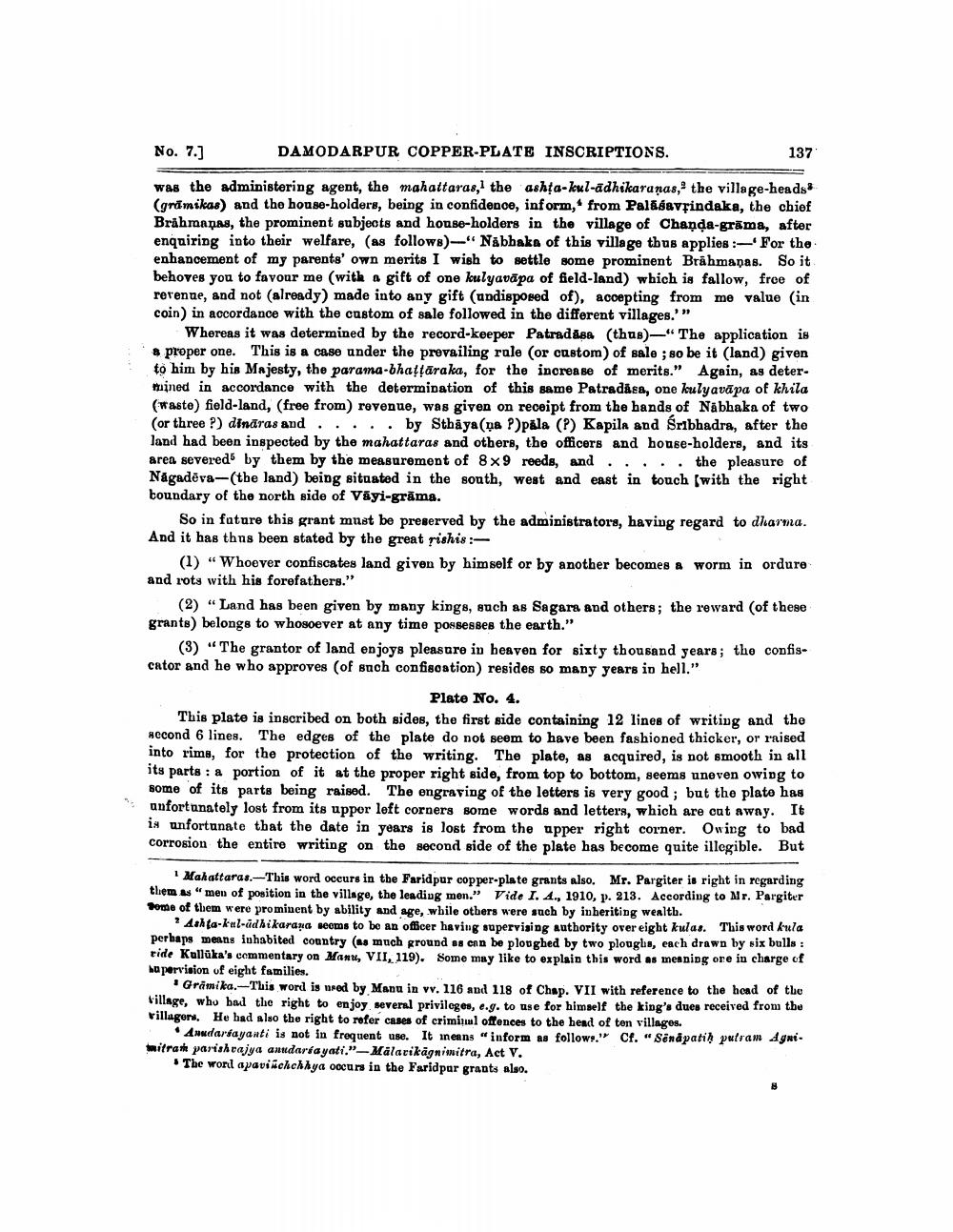________________
No. 7.]
DAMODARPUR COPPER-PLATE INSCRIPTIONS.
137
was the administering agent, the mahattaras, the ashța-kul-adhikaranas,' the village-heads (grimikas) and the house-holders, being in confidence, inform, * from Paldsavfindaka, the chief Brahmapas, the prominent subjects and house-holders in the village of Chanda-grima, after enquiring into their welfare, (as follows)—"Nábbaka of this village thus applies : For the enhancement of my parents' own merits I wish to settle some prominent Brahmanas. So it behoves you to favour me (with a gift of one kulyavāpa of field-land) which is fallow, froe of rerende, and not already) made into any gift (undisposed of), accepting from me value (in coin) in accordance with the custom of sale followed in the different villages.'”
Whereas it was determined by the record-keeper Patradasa (thus)—" The application is & proper one. This is a case under the prevailing rale (or custom) of sale ; so be it (land) given to him by his Majesty, the parama-bhatļāraka, for the increase of merits." Again, as determined in accordance with the determination of this same Patradies, one kulyavāpa of khila (waste) field-land, (free from revenue, was given on receipt from the hands of Nabhaka of two (or three ?) dināras and ..... by Sthāyana ?)pala (P) Kapila and Srbhadra, after the land had been inspected by the mahattaras and others, the officers and house-holders, and its area severed by them by the measurement of 8x9 reeds, and ..... the pleasure of Någadēva-(the land) being situated in the south, west and east in touch (with the right boundary of the north side of Váyi-grāma.
So in future this grant must be preserved by the administrators, having regard to dharma. And it has thns been stated by the great rishis:--
(1) “Whoever confiscates land given by himself or by another becomes a worm in ordure and rots with his forefathers."
(2) "Land has been given by many kings, such as Sagara and others; the reward (of these grants) belongs to whosoever at any time possesses the earth."
(3) "The grantor of land enjoys pleasure in heaven for sixty thousand years; the confiscator and he who approves (of such confiscation) resides so many years in hell."
Plate No. 4. This plate is inscribed on both sides, the first side containing 12 lines of writing and the socond 6 lines. The edges of the plate do not seem to have been fashioned thicker, or raised into rims, for the protection of the writing. The plate, as acquired, is not smooth in all its parts: a portion of it at the proper right side, from top to bottom, seems uneven owing to some of its parts being raised. The engraving of the letters is very good; but the plate has unfortunately lost from its upper left corners some words and letters, which are cut away. It is unfortunate that the date in years is lost from the upper right corner. Owing to bad corrosion the entire writing on the second side of the plate has become quite illegible. But
Mahattaras.--This word occurs in the Faridpur copper-plate grants also. Mr. Pargiter is right in regarding them as "men of position in the village, the leading men.” Vide I. 4., 1910, p. 213. According to Mr. Pargiter Some of them were prominent by ability and age, while others were such by inheriting wealth.
Ashfa-kul-adhikaraga seems to be an officer having supervising authority over eight kulas. This word kula perhaps means inhabited country as much ground as enn be plougbed by two ploughs, each drawn by six bulls : ride Kullaka's commentary on Manu, VII, 119). Some may like to explain this word as meaning ore in charge of bupervision of eight families.
Gramika.This word is wrod by Manu in vv. 116 and 118 of Chap. VII with reference to the head of the village, who bad the right to enjoy several privileges, e.g. to use for himself the king's dues received from the villagors. He had also the right to refer cases of criminal offences to the head of ten villages
. Anudarsayanti is not in frequent use. It ineans "inform as follows. Cf. " Senapatid putram dgni mitran parishvajya anudaríayati."-Malavikagnimitra, Aet V.
The worl apaviüchelnya oocurs in the Faridpar grants also.




